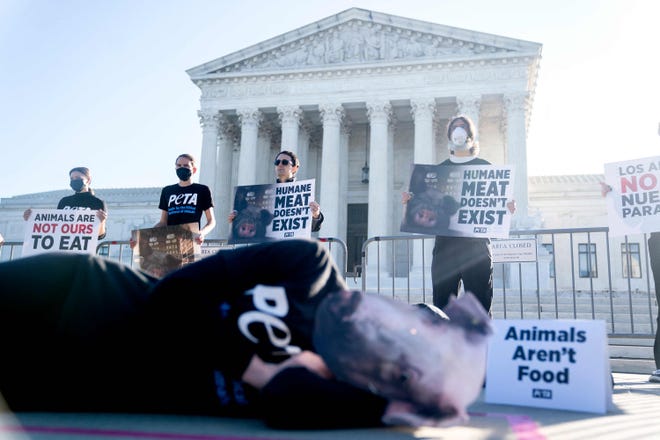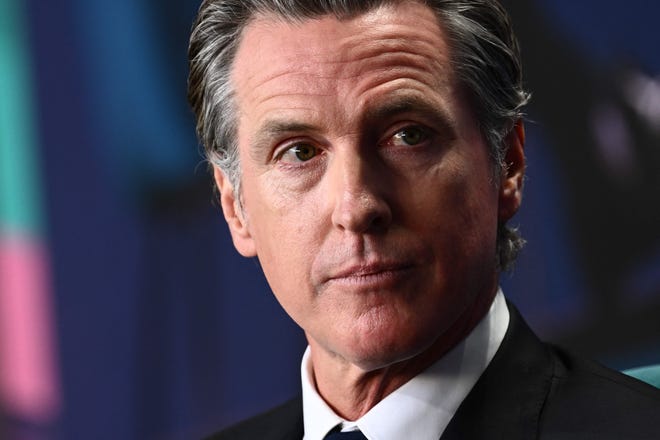Supreme Court docket pork determination could empower states to set nationwide coverage
[ad_1]
WASHINGTON – Purple states have required publishers to change the content of historical past textbooks to downplay race struggles and play up religious figures. And blue states have approved environmental standards which might be more durable than these in different elements of the nation.
Typically these insurance policies and others prefer it spill outside a state’s lines.
Now, some consultants say a brand new Supreme Court decision upholding a California animal welfare law would possibly make it simpler for states − conservative and liberal − to impose coverage decisions on giant swaths of the nation.
“In the event you’re Gavin Newsom or Ron DeSantis and also you’re trying to venture your laws outdoors of your state, you most likely really feel extra assured at present than you probably did yesterday,” stated Ruth Mason, a College of Virginia College of Regulation professor, referencing the Democratic governor of California and the GOP governor of Florida.
Determination:Supreme Court sides with California on animal welfare law that could have impact beyond bacon
Argument:Supreme Court majority questions California law regulating pig pens, pork products
How a Supreme Court docket case about bacon might empower states
In California, pork should come from pigs which have bigger pens than most farmers present. The animal welfare legislation in query − often called Proposition 12 − requires firms promoting pork in California to make sure the sow from which the butchered pig was born was housed in no less than 24 sq. toes of ground house. Whereas California residents devour loads of pork, the state produces little or no of it – that means Prop 12’s burden falls mostly on farmers in the Midwest and South.
The pork trade sued, claiming the Structure bars some of these interstate insurance policies in nearly each case. A 5-4 majority of the Supreme Court docket balked at that interpretation Thursday. However the closely fractured determination did little to make clear what’s allowed and what is not.

To say there’s not a hard-and-fast rule, because the court docket did, “appears proper,” stated Mason, an knowledgeable in federalism. “However then what’s the rule? The rule cannot be there isn’t a restrict on what a state can do.”
Michael McConnell, director of the Constitutional Regulation Heart at Stanford Regulation College and a former federal appeals court docket decide, stated he, too, is anxious about how states will reply to the choice.
“I concern the court docket’s opinion will open the door to any variety of state-level makes an attempt to impose their needs on the nation as an entire,” McConnell stated, “even when the results are solely in different states.”
Abortion, surroundings, tech: How would possibly states reply?
States have adopted divergent insurance policies in recent times on schooling, the surroundings, labor, well being care and different points controversial and mundane. State responses to the Supreme Court docket’s determination final yr to overturn Roe v. Wade illustrate the purpose, with many conservative states banning abortion altogether and a few liberal states taking steps to develop entry.

Issues get extra sophisticated when these insurance policies affect interstate commerce. One of the notable examples are environmental insurance policies. California and different states have imposed vehicle emission standards, as an illustration, which have compelled a lot of the auto industry to bend to their will.
Different insurance policies could also be much less apparent: New York required web service suppliers to offer reduced pricing for low-income families. California imposed its personal web neutrality legislation on web suppliers, barring them from blocking or slowing some traffic or charging for quicker supply of some content material.
Code:Would a code of ethics fix the Supreme Court? Some raise concerns about enforceability
Abortion:How a Supreme Court case about pig farms could muddy looming debate over out-of-state abortions
“There are nonetheless some open questions concerning the extent to which states can problem guidelines like this,” stated Tejas Narechania, college director on the Berkeley Heart for Regulation & Expertise. “I believe the choice right here possibly factors towards the states with the ability to do extra of that. I believe that’ll be true within the tech house, particularly.”
Kavanaugh frets about ‘blueprint’ for different states
In a partial dissent, Justice Brett Kavanaugh fretted that the court docket’s determination would offer a “blueprint for different states” and usher in a “new period” by which one state makes an attempt to “unilaterally impose its ethical and coverage preferences” on others.
What if a state prohibits the sale of fruit packed by noncitizens, Kavanaugh requested. What if it bars the sale of products made by employees paid lower than $20 an hour, or who work for firms that decline to pay for contraception?
‘Countless litigation.’ Why some spillover could also be inevitable
California permitted the poll initiative in 2018 with assist from about 63% of voters. The U.S. Court docket of Appeals for the ninth Circuit batted away the problem from the pork trade and the Supreme Court docket affirmed that call.
Justice Neil Gorsuch, who wrote the court docket’s opinion, didn’t reply to these issues instantly. However he wrote that within the fashionable “interconnected nationwide market,” many state legal guidelines have the sensible impact of controlling conduct past that state’s borders.

Adopting the rule the pork farmers wished would, Gorsuch wrote, “solid a shadow” over what has lengthy been understood to be the flexibility of states to move legal guidelines affecting their very own residents.
“It could invite countless litigation,” Gorsuch wrote, “and inconsistent outcomes.”
[ad_2]
Source link